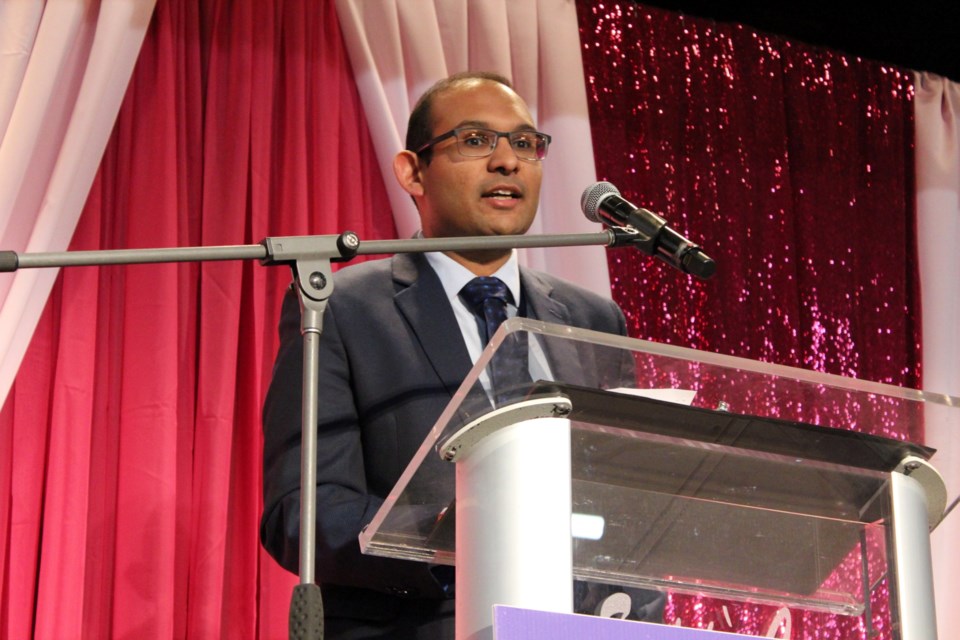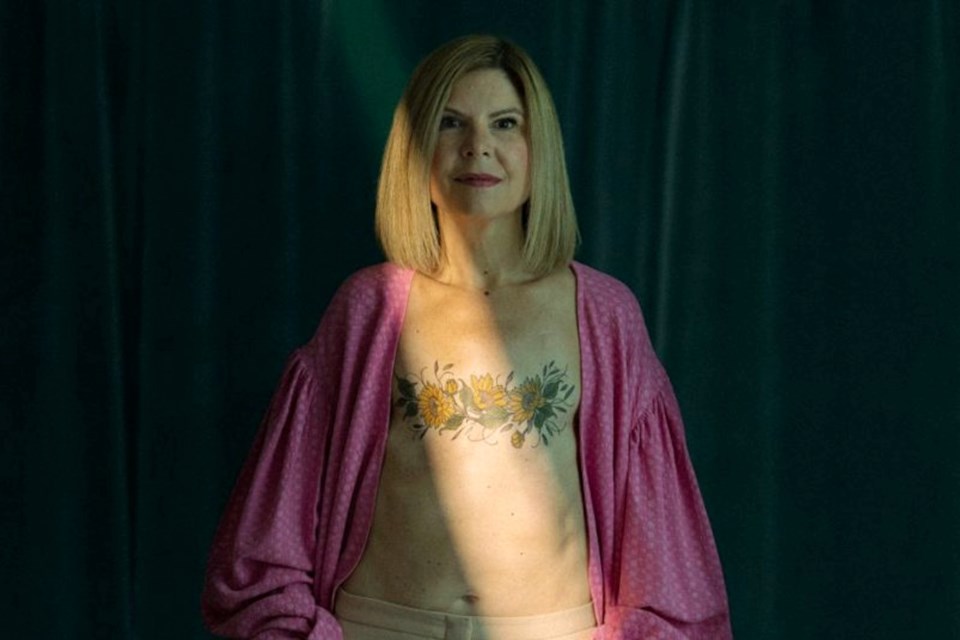You may have seen the image. After all, it was in a national commercial, on the side of buses across the country and even on a massive billboard at Yonge-Dundas Square in Toronto.
The photo is of Kim MacDonald, a veteran broadcaster with The Weather Network, breast cancer survivor and Breast Cancer Canada national spokesperson, showing her double mastectomy scar, which is inscribed with a tattoo of sunflowers.
MacDonald told the story of her tattoo and her decision to bare it to the world during her keynote speech at the Luncheon of Hope fundraising event Sept. 24.
The 26th annual Northern Cancer Foundation event has raised more than $1.1 million for cancer care and research at the Shirley and Jim Fielding Northeast Cancer Centre. Organizers hoped to bring in another $60,000 through this year’s event.
After getting a double mastectomy in 2017, her oncologist had told her to wait three years before considering reconstructive surgery, as her cancer was aggressive, and he was worried it might return.
Undergoing breast reconstruction wouldn’t be the best idea if she needed to have more cancer treatments.
So MacDonald stayed flat, saying it was the right decision for her. In 2022, on the fifth anniversary of her surgery, she decided she wanted to have artwork put over her scars.
“I wanted a tattoo of sunflowers, and so I got one,” she said. “There's a saying that goes, ‘Be the sunflower, stand tall and follow the sun.’ That's what I had been trying to do ever since I was diagnosed with breast cancer.
“And so with this tattoo, I felt transformed in a way. I had learned to accept my body as it was, and that was OK with me. There was something about this tattoo that made me feel beautiful and strong and a bit of a badass.”
MacDonald said when she was looking to have artwork done over her scars, she was hard-pressed to find examples on the internet of what that would look like.
So although she was a bit hesitant, she agreed to have a photo of her baring her mastectomy artwork used in their advertising campaign.
“I wanted to show breast cancer patients what was possible, and I wanted to normalize this body to society in general.” MacDonald said. “I was scared. This was indeed the most vulnerable thing that I’ve ever done.”
MacDonald was diagnosed with breast cancer at the age of 48 in late 2016 - Stage 2b Invasive Ductal Carcinoma, HER2+, to be exact.
But it was obvious to her that she had cancer even before she got the diagnosis. Her right breast had gone completely hard, she had a rash and her nipples started to retract.
Her tumour was 10 centimetres — about the size of a baseball — and she would require chemotherapy to shrink it before undergoing surgery. The chemotherapy was successful, and completely shrank the tumour, but MacDonald still underwent a double mastectomy to prevent her cancer from coming back.
Because of her HER2+ diagnosis (a breast cancer that tests positive for a protein called Human Epidermal Growth Factor Receptor 2, or HER2), she also underwent surgery to have a port put in her chest to receive Herceptin injections.
Without Herceptin, a drug that is a fierce fighter against certain breast cancers that’s been available in Canada only since 2000, MacDonald figures she wouldn’t be here today.
MacDonald wants to spread a message of early detection, pointing out that mammograms are now more accessible to women in their 40s in Ontario
“I want people to know that breast cancer can be curable if it's found early enough,” she said. “The difference between Stage 0 and Stage 4 is timing. Stage 0 has a 99-per-cent survival rate. Stage 4, 31 per cent, but that number is getting better with research. So get screened, ask questions. Breast cancer can affect a woman of any age, so don't think that it's an older woman's disease.”
She also spoke about the importance of breast cancer survivors speaking out about their diagnosis and spreading awareness and understanding — and they don’t need to be a television broadcaster with a national profile like she is.
MacDonald shared with the audience one of her darkest moments during chemotherapy treatments, lying sick and weak on her bathroom floor, bald, and not sure she could get up. But she did, and she’s glad.
“On your darkest days, when you feel like everything is impossible, be brave, find your voice, speak up, because you never know how it can help you or someone else,” MacDonald said.

During the Luncheon of Hope event, Dr. Abhenil Mittal, a medical oncologist practising in Sudbury, shared some of the advances in breast cancer research over the years.
“There has been remarkable progress in all aspects over the last few decades,” he said. “Overall, mortality from breast cancer has declined significantly by more than 50 per cent compared to the 1990s.
“In general, 90 per cent of women who are diagnosed with breast cancer live more than five years. Moreover, advancements in surgical techniques, radiation planning and drug delivery have been treatments much better tolerated.
“All of this has been possible through collaborative research, funded through generous donations and sacrifices through participation in clinical trials of patients like yourself.”
Heidi Ulrichsen is Sudbury.com’s assistant editor. She also covers education and the arts scene.
